KHANH HOA Not only turning barren, rocky land into a lush green coconut farm, the owner of Phuong Hoang Farm also periodically feeds the coconut trees with salt, giving them delicious, sweet fruit.
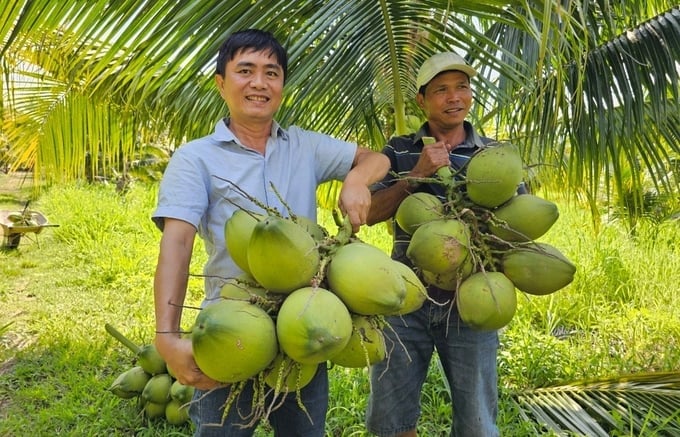
Phuong Hoang Farm coconut farm harvests organically grown coconut bunches. Photo: KS.
"Green from root to tip" criteria
In the midst of the intense heat of April, we arrived at the Phuong Hoang Coconut Farm located at the foot of the Phuong Hoang Pass on Highway 26 (in Ninh Tay Commune, Ninh Hoa Town, Khanh Hoa ). Entering the farm, we saw a cool green space from the ground to the rows of coconut trees laden with fruit.
Mr. Nguyen Phi Truong, owner of Phuong Hoang Farm coconut farm, said that his philosophy of clean farming is to keep green space from the garden ground to the treetops. Therefore, he keeps the grass in the garden naturally to cover and protect the soil, limit erosion, leaching and help the soil retain moisture better. This has been effective even in hot weather, the coconut garden is still moist and the grass is green.
Furthermore, keeping the grass in the garden trimmed or letting it die naturally will help improve the organic matter in the soil, helping the coconut garden grow and develop well.
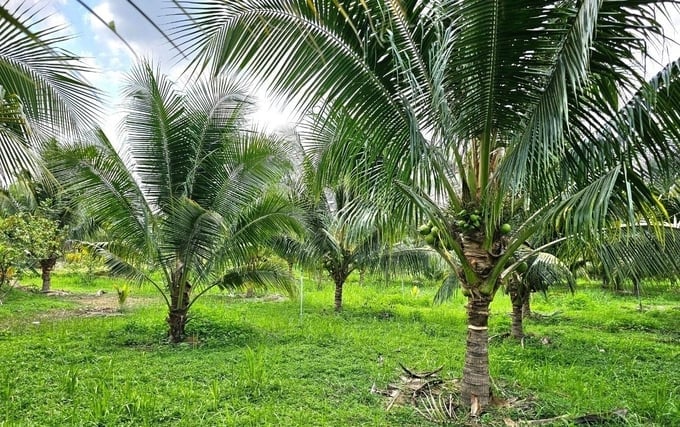
The coconut farm is green from the roots to the top of the tree in the dry weather. Photo: KS.
That is also one of the "5 no" principles including: No use of herbicides, no chemical fertilizers, no chemical pesticides, no growth stimulants, no modified varieties and protection of natural enemies that Phuong Hoang Farm coconut farm has consistently produced in an organic direction since 2018 until now.
Leading us to visit the coconut garden, Mr. Nguyen Phi Truong introduced the entire farm surrounded by Chinh stream with a total area of about 20 hectares. Initially, he planted 4 hectares of coconut trees with 1,000 trees and many fruit trees including apples, guavas, plums, papayas... Of which, 2 hectares of coconut trees have produced a stable harvest of about 4,000 - 5,000 fruits/month. The coconut garden is designed to be planted in straight rows, with trees about 6 meters apart and a modern sprinkler and water-saving irrigation system is applied.
To have a coconut garden full of fruit like today is a process that Mr. Truong has built with a lot of hardship and difficulty. Because before this land was very dry and rocky, so growing any tree was not effective. After buying it from the people, Mr. Truong has turned this place into lush green coconut gardens that few people have been able to grow on the mountain before.
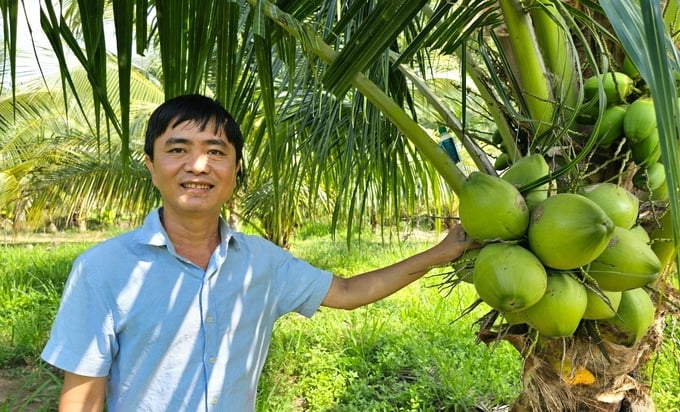
Mr. Nguyen Phi Truong, owner of Phuong Hoang Farm coconut farm. Photo: Architect.
“To practice organic farming, experts say that the land needs to rest for 24 months and let grass grow naturally to detoxify the soil. I stopped production on this land for 3 years before planting coconuts,” said Nguyen Phi Truong, adding that the coconut variety grown on the farm is Ninh Da coconut (Ninh Hoa town) - one of the specialties in Khanh Hoa province that is favored by consumers because of its sweet and delicious water, thin flesh, and green skin. The seedlings were carefully selected by him from ancient coconut gardens in Ninh Da ward to ensure quality.
According to our observations, the coconut trees here are hung with perforated plastic bottles containing camphor pellets. Seeing my curiosity, Mr. Nguyen Nong, a farm worker, said that this is the farm’s way of repelling insects, especially coconut beetles. Currently, the farm does not use pesticides for spraying.
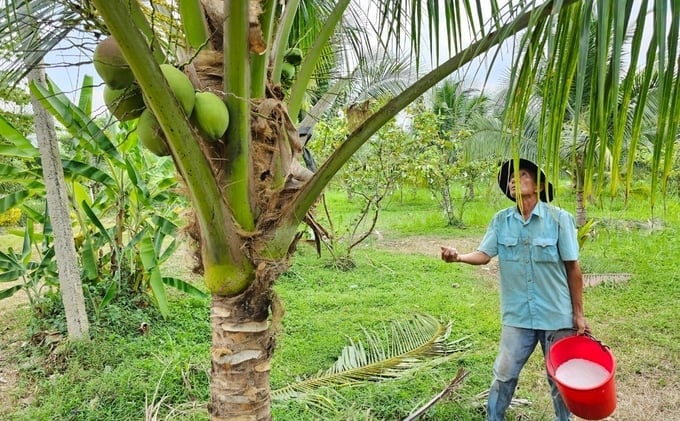
Workers at the farm feed the coconuts with salt by putting it on the coconut leaves and treetops. Photo: KS.
In addition to the above measures, the farm also plants canary flowers, myrtle, royal poinciana, etc. around the garden to attract natural enemies such as bees and butterflies to reside and eat harmful insects. With the above method, harmful insects in the coconut garden are very few and the farm has never had to use pesticides, even licensed biological pesticides, to destroy harmful organisms.
Mr. Le Van Phat, technical manager of Phuong Hoang Farm coconut farm, affirmed: “The coconut plantation at the farm is completely clean from soil, water and fertilizer. The soil has been detoxified and treated according to recommendations, the water used to irrigate the coconut is mainly natural spring water. The fertilizer used is green manure from the remains of green trees in the garden and organic fertilizer imported from Japan, which is very high quality.”
Unique for "salt-eating" coconut
In essence, organic coconut, according to Mr. Nguyen Phi Truong, is grown in accordance with the natural environment, as our ancestors did in the past. However, in reality, when Mr. Truong makes organic coconut products, most people wonder: "Which coconut is not organic?" With many years of experience growing coconuts and a passion for this crop, Mr. Truong explains that the above way of thinking is no longer correct today for the following reasons:
Firstly, organic coconuts are chemical-free, but if farmers spray herbicides, the toxins will seep into the soil and then into the groundwater. While coconut trees use water mainly, they absorb groundwater very strongly. Therefore, the nature of the coconut is no longer organic as before.
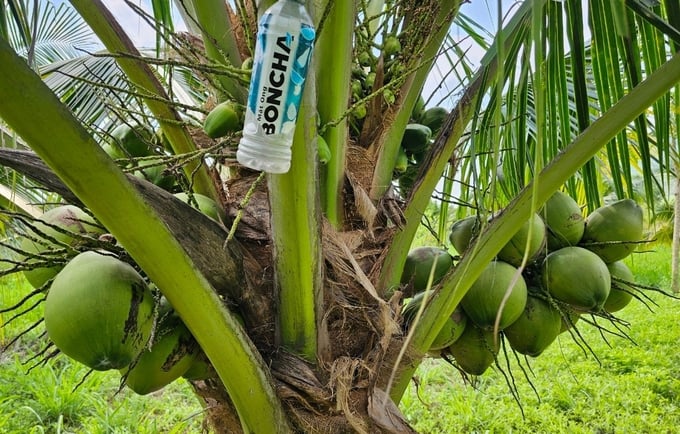
Coconut trees hang camphor bottles to repel insects. Photo: KS.
Second, coconut trees have many harmful pests such as beetles, coconut worms, ants, etc., so if you do not take good care of them and kill them, the tree will die. If you rush to use pesticides to kill them, thinking that the hard coconut shell will not affect the fruit, you do not know that the coconut tree has many flower clusters, so spraying like that can cause the coconut to be contaminated with chemicals from the time the fruit is young.
Third, to increase productivity, people use chemical fertilizers instead of manure. Overuse of chemical fertilizers will make the soil more barren and more polluted.
In addition, according to experts, when the fresh coconut is cut, the white flesh will be exposed. After a short time, the flesh will turn dark black or yellow-brown due to the sap flowing out. However, many sellers, in order to keep the appearance, have dipped it in chemicals to preserve the whiteness. This is also the reason why the coconut is no longer organic.
To feel how organic coconuts differ from regular coconuts, the garden owner chopped a few for us to enjoy right away. My colleagues, after drinking the coconut water, all praised the sweet, rich taste, which was very different from the coconuts from other regions.
Hearing that, the owner of Phuong Hoang Coconut Farm said that, in addition to the nature of the breed, the coconuts here are mainly watered with natural spring water, especially the coconut trees are periodically "fed salt" and fertilized with organic fertilizer, creating a very unique and special flavor.
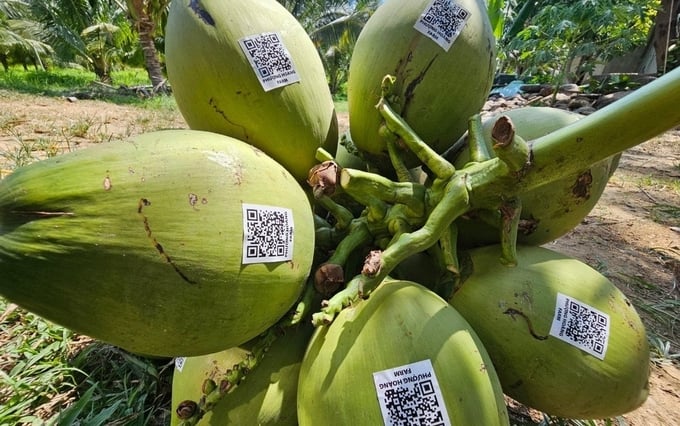
Coconuts from Phuong Hoang Farm are labeled with traceability codes before being delivered to consumers. Photo: KS.
According to the owner of this farm, the investment cost of growing organic coconuts is certainly higher than normal production. However, in return, the products are of high quality and have a brand, so the selling price is very high.
“Currently, the quality of Phuong Hoang Farm’s coconuts has been highly appreciated by consumers. In addition to being consumed at some hotels in Nha Trang City, our coconuts are also served at local conferences and businesses in need with a selling price of about 20,000 VND/fruit, and sold in the garden for about 15,000 VND/fruit - double that of traditionally grown coconuts.
To help consumers identify the farm’s coconuts, we have created a traceability code that is attached to each coconut. From there, consumers can trace the origin and the entire process and organic coconut growing method of the farm,” the farm owner shared.
Mr. Nguyen Phi Truong, owner of Phuong Hoang Coconut Farm, said that he is currently working with the Khanh Hoa Department of Crop Production and Plant Protection and the Department of Crop Production to inspect, evaluate, appraise and issue organic certificates for the farm's coconuts. At the same time, the farm is expanding the coconut acreage, as well as establishing the Phuong Hoang Green Agriculture - Tourism Cooperative to connect, guide and transfer techniques to people growing coconuts in an organic direction to meet market demand.
Source










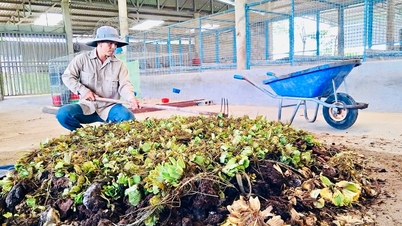

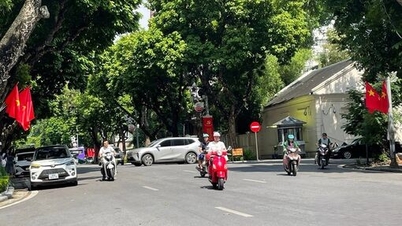

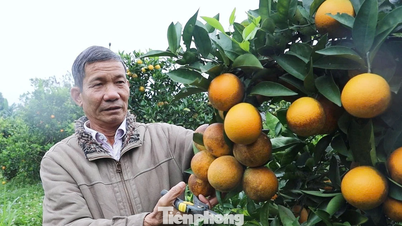

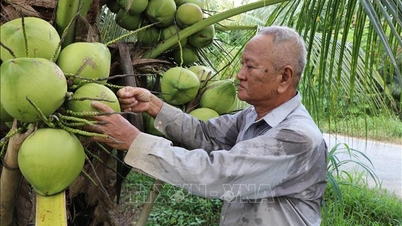





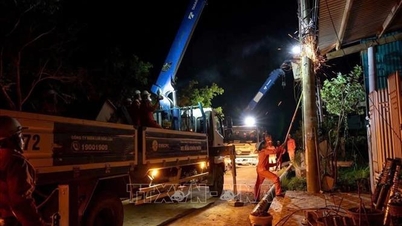
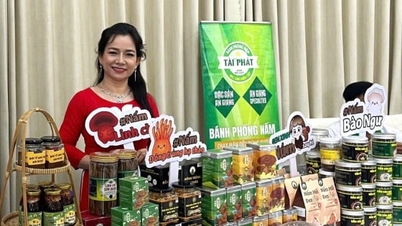

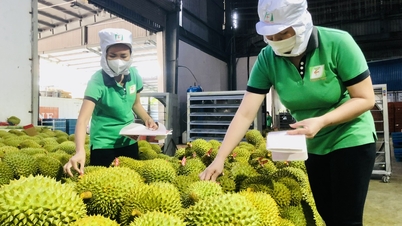

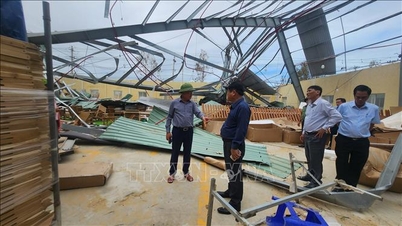




![The person who 'broke the fence' for Dat Cang's agriculture: [Part 2] Preserving the value of Doan Xa land](https://vphoto.vietnam.vn/thumb/402x226/vietnam/resource/IMAGE/2025/11/10/1762727497156_2926-nguoi-xe-rao-mo-loi-cho-san-xuat-nong-nghiep-dat-cang-165925_730.jpeg)

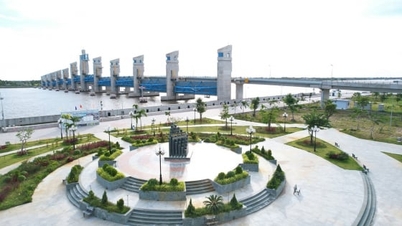
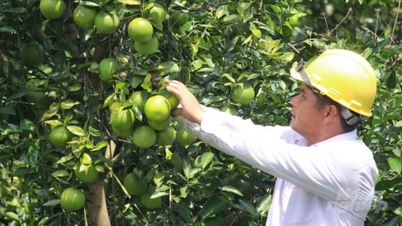










































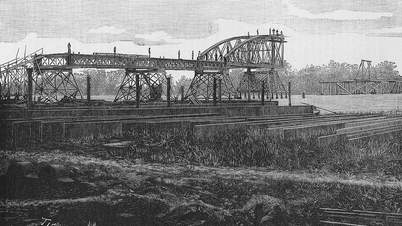
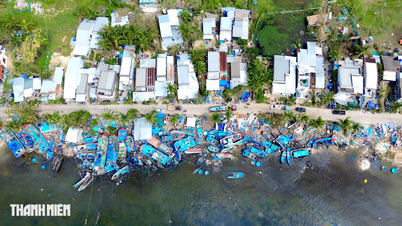

















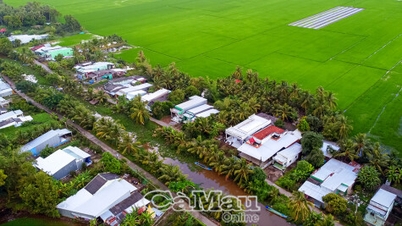
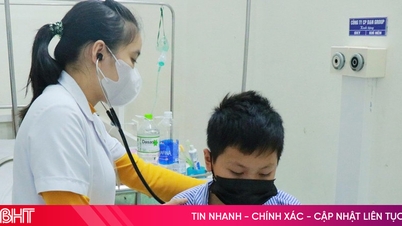
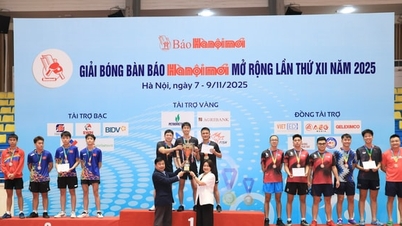












Comment (0)